Introduction: Mary Harrell-Sesniak is a genealogist, author and editor with a strong technology background. In this guest blog post, Mary searches old newspapers to find the stories of women who served during some of our nation’s earlier wars—as army nurses, camp followers, and Red Cross volunteers.
There are numerous groups that celebrate the lives of (mostly men) veterans from America’s past wars, but many of us wonder: what about the women? Certainly women on the home front were supportive of their husbands, fathers and brothers at war—with sewing, cooking and other tasks to contribute to the war effort and stability at home.
But many women during wartime did much more—even making the decision to assist as military “camp followers” ready to tend to the needs of the soldiers. If you were a wife or mother who had sent a spouse or sons to war, what would you do?
Would you remain at home, or would you want to be close at hand, making sure the men were well fed and nursed in the event of battle injuries? Of course, most women did continue to raise their families, work the fields and keep the household running—but some went off to war to support the troops.
Most of these brave women’s war stories have never been told, as history books make scarce mention of them. Firsthand accounts of these women camp followers and soldiers’ wives are few—but with a little help from historical newspapers, we can get a glimpse into the lives of these forgotten women of war.
Elizabeth Dodd, Revolutionary War Camp Follower
In this 1849 obituary we can read the life story of Elizabeth Dodd, who led quite an eventful life in her 111 years. As the obituary comments: “In the death of this aged person, there is a volume of history lost. Living in great retirement, the relict of a forgotten age, few knew the stories she could tell of the brave old days.”
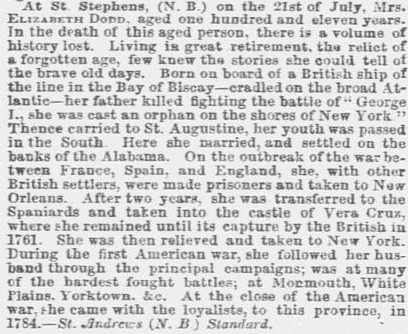
Dodd was a camp follower during the American Revolutionary War: “During the first American war, she followed her husband through the principal campaigns; was at many of the hardest fought battles; at Monmouth, White Plains, Yorktown, &c.”
Susannah Clark, First Army Nurse Pensioned
Another fascinating account is that of Mrs. Susannah D. Clark who, according to this 1899 newspaper article, nursed American soldiers in two wars and has the distinction of being the first army nurse pensioned in U.S. history.
According to the old newspaper article: “As a bride of a few days, she cared for the suffering and dying during the Civil War, and as a gray-haired grandmother she looked after and nursed back to good health two of her grandsons during the late Spanish-American unpleasantness.”
![philadelphia-inquirer-newspaper-0904-1899-susannah-clark Mrs. [Susannah] Clark Nursed Soldiers of Two Wars, Philadelphia Inquirer newspaper article 4 September 1899](https://blog.genealogybank.com/wp-content/uploads/2013/11/philadelphia-inquirer-newspaper-0904-1899-susannah-clark.png)
Officers typically had an array of camp followers—some there to directly assist the officers with many varying roles, including baggage handling, while others came along to sell their wares.
This 1792 newspaper article discusses General Abercrombie and the Grand Army, reporting that he “sent off all his baggage that was on the out side of the fort, to Mysore, under an effort of cavalry, and accompanied by his camp followers.”
![daily-advertiser-newspaper-0903-1792-grand-army-abercrombie Grand Army [under General Abercrombie], Daily Advertiser newspaper article 3 September 1792](https://blog.genealogybank.com/wp-content/uploads/2013/11/daily-advertiser-newspaper-0903-1792-grand-army-abercrombie.png)
Military camp followers have participated in almost every war, here and abroad. This 1885 newspaper article gives an account of a British “Paper Army.” It reports that during a recent inspection, the actual number of men was much lower than official reports had indicated, so “cooks, servants, and camp followers were hastily crowded into the ranks to satisfy the inspectors.”
![wisconsin-state-journal-newspaper-0213-1885-british-paper-army A [British] Paper Army, Wisconsin State Journal newspaper article 13 February 1885](https://blog.genealogybank.com/wp-content/uploads/2013/11/wisconsin-state-journal-newspaper-0213-1885-british-paper-army.png)
This 1911 newspaper article gives a report from the Mexican War. After one battle, supply wagons that had been left on the battlefield were inspected by Americans protected by a Red Cross flag.
The historical newspaper article reports: “However, after the Americans demonstrated that it was safe to approach the wagons, the Mexican commander sent a detail under protection of machine guns to bring the wagons into camp. The supplies were evidently a welcome addition to the commissary department of the federals, and were received with handclapping on the part of the women camp followers.”
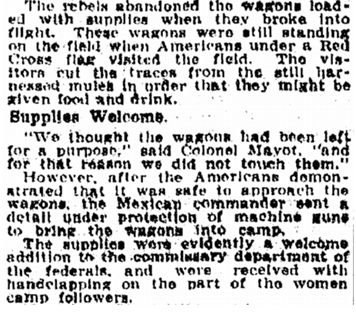
Clara Barton, the “Angel of the Battlefield”
One female camp follower who did achieve fame was Clara Barton (1821-1912), founder of the American Red Cross Society.
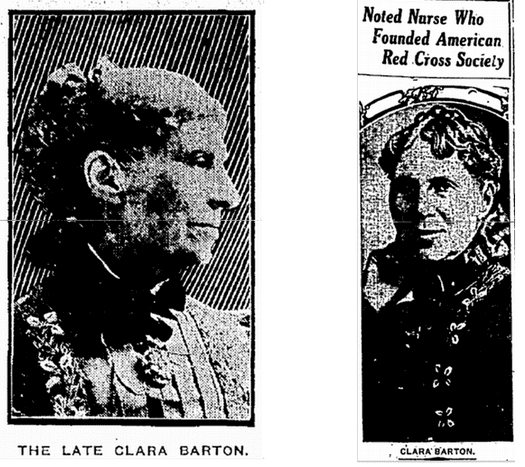
Fort Worth Star-Telegram (Fort Worth, Texas), 12 April 1912, page 1 (right)
Because of her nursing work on the front lines during the Civil War, Barton was known as the “Angel of the Battlefield.” After the war, she traveled to the infamous Confederate prisoner-of-war camp Andersonville in Georgia, where she researched the graves of thousands of Union soldiers, identifying the dead and writing letters telling Northern families what had happened to their missing loved ones. (See National Park Service article at www.nps.gov/ande/historyculture/clara_barton.htm.) Later, she provided nursing services in Europe during the Franco-Prussian War, then came home to promote formation of the American Red Cross. Barton’s long career of service began as a nurse camp follower.
As the following 1912 newspaper obituary mentions, Clara Barton “gave her life to humanity, and humanity mourns at her death…Not till she was 40 years old did Miss Barton start upon her notable life work. Then came the conflict between the American states, calling every patriot to duty. Miss Barton could not shoulder a musket, but she could and did [do] what was as essential; she went to the front as a nurse.”
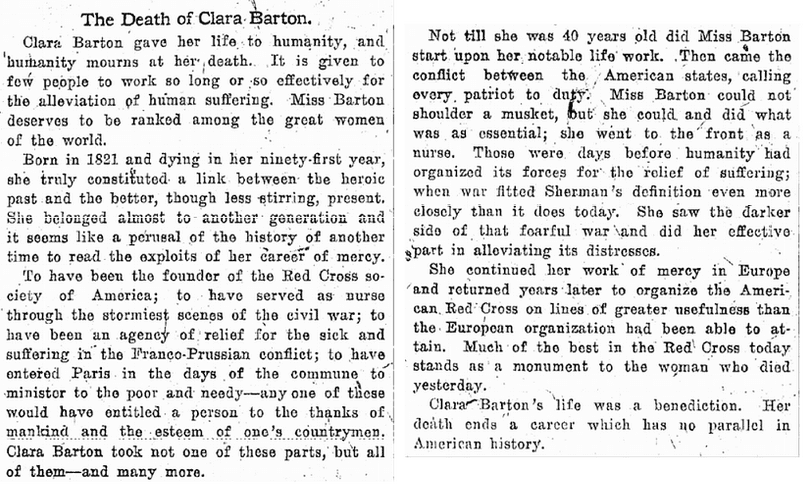
Eleanor Guckes, My WWII Red Cross Ancestor
This photograph of my grandmother Eleanor (Scott) Guckes shows her wearing an American Red Cross uniform in 1942 during WWII. According to our family records, she assisted in the war effort by driving an ambulance while her husband was serving with the Navy in the Pacific Theatre.
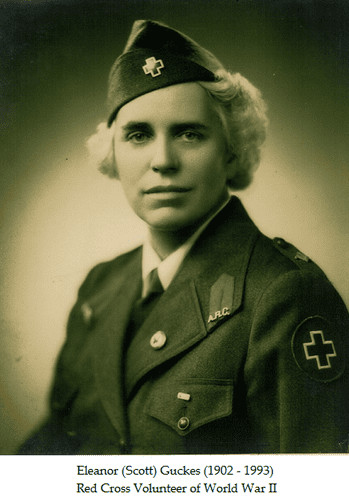
Do you have a female family member who served in the Red Cross or assisted as a camp follower during one of our nation’s wars? If so, please share your ancestor’s story with us in the comments section.

Thank you for this information and site to honor our female ancestors! One of my ancestors, Mara Sargent, married to Joseph Grace, tells the tale of her role in nursing the wounded from the Battle of Bunker Hill, while as a teenager living in Boston. She provided the documentation for her service while applying for her husbands Revolutionary War pension.
Sue,
Thank you for sharing this information about Mara Sargent. I’m going to read the pension application thoroughly! What a wonderful treasure.
Mary